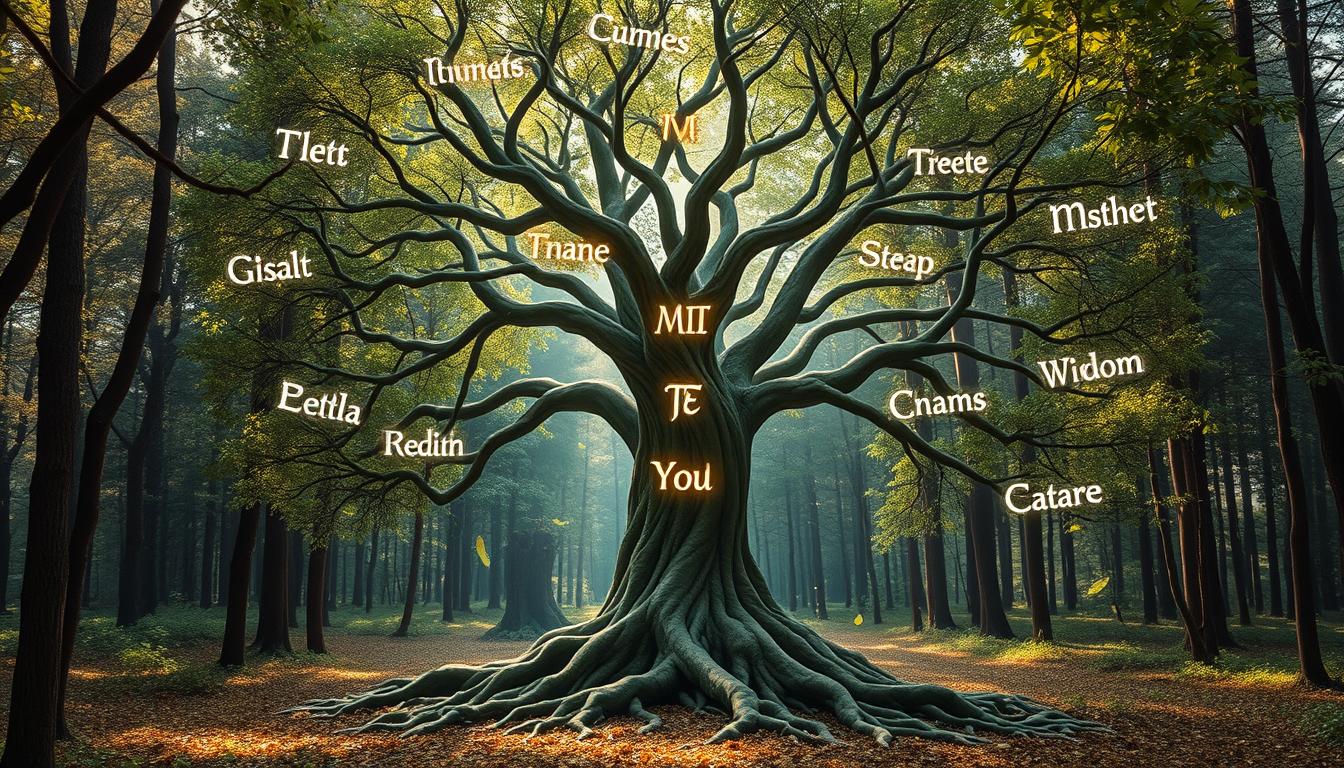A mystical landscape features a flowing river that forms the shape of various names, surrounded by vibrant flora and fauna. In the background, a starry night sky fills with shimmering constellations that resemble letters and symbols. Ethereal light beams illuminate the river, creating a sense of discovery and wonder.
Every name tells a unique story. Your name shares more than just a label.
It reveals a piece of your identity. Names carry deep cultural and familial significance.
They connect us to our roots and experiences. Name meaning goes beyond simple words.
Each name represents a complex tapestry of heritage. It reflects family traditions and personal narratives.
Names can come from biblical references or cultural trends. They show our social and personal backgrounds.
Understanding name significance helps appreciate unique identity. Names are potent markers of personal history.
They shape how others see us. Names influence our interactions.
They connect us to our human experience. Let’s uncover the stories behind your name.
The Importance of Names in Our Lives
Names are more than just labels. They show who we are and shape how others see us.
Names can affect our first impressions and job chances. They reflect our family history and cultural background.
In jobs, names might change how people think of us. This shows how names are significant.
Different cultures have unique ways of choosing names. These customs make names mean even more.
Names tell stories about us. They carry feelings and history that go beyond just calling someone.
The Origin of Your Name
Names hold rich cultural stories. They link us to our ancestors and heritage.
Name origins offer insights into family history. Some names come from old jobs, places, or personal traits.
Surnames like “Smith” show past occupations. First names often come from religious texts or family traditions.
Different cultures have unique naming practices. European names often come from saints or biblical figures.
Native American names often relate to nature or achievements. Middle Eastern names focus on family and spiritual meanings.
Exploring your name’s history can be exciting. Websites and databases help trace name origins.
Technology makes finding linguistic roots easier than ever. Each name tells a story passed through generations.
Names carry memories, identities, and cultural meanings. Understanding your name’s origin deepens your sense of identity.
What Does Your Name Mean?
A mystical tree of names with roots intertwining, each branch representing a different name’s meaning, glowing symbols of personality traits symbolizing strength, wisdom, and creativity, surrounded by a serene forest with soft light filtering through leaves.
Every name has a unique story. Exploring your name’s meaning unlocks a world of cultural heritage.
Name interpretation reveals connections to family history and identity. It goes beyond simple labels.
Different cultures give names deep meanings. Some reflect traits, while others honour ancestors or nature.
A name can symbolize strength or hope. Digital tools help uncover rich stories behind names.
Online dictionaries offer insights into name origins. You might find links to ancient traditions or cultural symbols.
Names aren’t random sounds. They represent personal stories with historical significance.
Your name may come from family or culture. Understanding its meaning can deepen your sense of identity.
Experts study the complex world of name meanings. Each name tells a unique story.
Exploring your name’s meaning connects you to history. It’s a way to appreciate your cultural background.
Different Name Types and Their Significance
Names are more than just labels. They show who we are and where we come from.
Given names often reflect family or cultural choices. Surnames can reveal our family history.
Middle names add extra meaning to our identity. They may honour relatives or show cultural traditions.
Nicknames are fun names that come from our lives. They can show our traits or experiences.
Different cultures have unique naming practices. Native Americans might have names based on traits.
Spanish names often use both parents’ last names. This shows how names can express identity.
Learning about name types is fascinating. Each name tells a unique story about a person.

How Names Influence Perception
Names shape how people see us. When someone hears your name, hidden biases can affect their first impression.
Name perception goes beyond simple identification. It can impact job opportunities and relationships.
Name bias works quietly in many areas. Some names might trigger stereotypes about a person’s background.
This can create challenges for people with names outside cultural norms.
Knowing your name’s impact can reveal surprising social dynamics. Employers may judge based on name traits.
Some names might seem more professional. Others could face unintended discrimination.
Research shows name perception is deeply rooted. People make quick mental links when hearing a name.
They connect it to ideas about personality and cultural identity. Recognizing these biases helps create more inclusive interactions.
To overcome name bias, we need awareness. We should challenge stereotypes and focus on individual strengths.
This way, we can value people beyond their names.
Trends in Naming Conventions
Naming trends have changed a lot lately. Parents pick names with more creativity now.
Popular names mix old and new ideas. Social media and famous people shape naming choices.
Unique names are more common today. This is different from how names were chosen before.
TV shows and movies affect name picks. Musicians and actors start new naming trends.
Different cultures bring in new naming ideas. This makes more names to choose from.
Young parents often pick notable names. They want names that mean something to them.
This is different from the old ways of naming. Names used to come from family or culture.
Names tell us about society’s values. They show how our culture is changing.
Sharing Your Name Story
Your name is more than just its origin. It’s a personal story that connects you to your family history.
Each name has a unique tale to tell. Explore and share this story with your loved ones.
Your name links you to your roots. Talk to family members about why you got your name.
Ask grandparents or relatives about family naming traditions. They might have interesting details to share.
Online tools make name research easy. Use genealogy sites and archives to trace your name’s history.
Create a scrapbook of your findings. This will keep family stories safe for future generations.
Share your name story with others. Tell it at family events or write about it online.
Keep your name’s meaning alive. Write it down in journals to preserve its unique significance.
FAQ
Why do names matter so much in our identity?
Names are vital to our identity. They link us to our culture, family history, and sense of self.
Your name shapes how people first see you. It affects first impressions and social interactions.
How can I find out the meaning of my name?
Use online databases, cultural name dictionaries, or genealogy websites. Ask family members about the meaning of your name in your family tradition.
Do names impact how people perceive me?
Yes, studies show names can affect job applications and social interactions. Knowing this can help you overcome potential challenges.
What are the current trends in baby naming?
Trends range from classic names to unique, creative choices. Pop culture, celebrity names, and cultural heritage influence naming decisions.
How do different cultures approach naming?
Naming customs vary widely across cultures. Some use patronymic systems, while others have complex naming rituals.
These different approaches show how cultures view personal identity and family ties.
Can I change my name if I don’t like its meaning?
Yes, you can legally change your name. The process varies by location but usually needs court approval.
Changing your name can help you feel more connected to yourself.
How can I research my family’s naming history?
Talk to older relatives and explore family records. Use genealogy websites like Ancestry.com to trace your family history.
DNA testing can reveal your family’s cultural origins and name background.
You can also read more : How to Get Rid of FUPA: Effective Tips and Strategies



